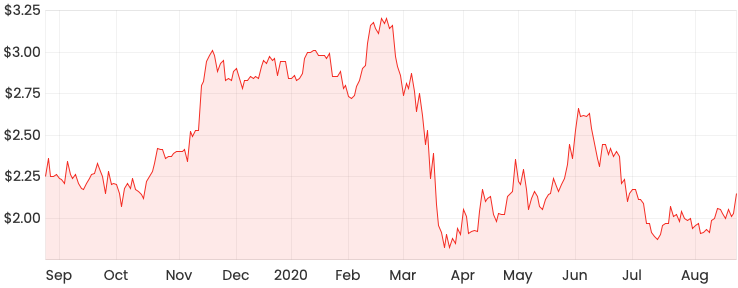The Bingo Industries Ltd (ASX: BIN) share price is soaring today as investors respond to the company’s full-year result.
In early afternoon trade, Bingo shares have jumped nearly 14% to $2.44. As you can see in the chart below, Bingo shares were sold-off following the onset of COVID-19 so today’s share price rise will be a welcome reprieve for shareholders.

For those unfamiliar, Bingo Industries is a waste management business that provides residential and commercial waste services and recycling services. Bingo started in 2005 when the Tartak family purchased a small skip bin business.
Since then, it has grown into a fully-integrated recycling and resource management company, with a workforce of over 1,000 people and a fleet of around 330 trucks across New South Wales and Victoria.
What did Bingo report?
The headline results from Bingo’s report include:
- Underling revenue up 21% to $486.7 million
- Underlying EBITDA up 40.8% to $152.1 million
- Underlying EBITDA margin improved 440 basis points to 31.3%
- Statutory net profit after tax (NPAT) nearly tripled to $66 million
These underlying figures primarily exclude the $22.4 million gain on the sale of the Banksmeadow facility. Bingo agreed to divest the processing facility in 2019 in order to ease ACCC competition concerns regarding its major acquisition of Dial-a-Dump Industries
(DADI).
“We are now three years into a five-year strategy and have delivered against our stated objectives, weighting our business model towards post-collection infrastructure assets. This has enabled us to deliver a solid result in a challenging market,” said managing director and chief executive, Daniel Tartak.
On the balance sheet, Bingo extended its borrowings to $363.7 million. Combined with cash and cash equivalents of $56.8 million, the company ended FY20 in a net debt position of $306.9 million.
Segment results
Taking a look at segment performance, collections revenue climbed 4.1% to $222.3 million, driven by a full-year contribution from DADI as well as an increased operating fleet across Victoria and Bingo Commercial. The collections EBITDA margin improved 130 basis points to 19.3%, helping EBITDA grow by 11.5% to $42.8 million.
Bingo’s post-collections revenue increased 34.9% on the prior year to $329 million. Again, this was driven by the contribution from DADI. The post-collections underlying EBITDA margin expanded by 550 basis points to 33.1%, underpinned by operational efficiencies, cost synergies and the NSW network configuration. This helped underlying EBITDA jump by 62.2% to $109 million.
Bingo noted it was on track to achieve pre-COVID guidance up until the fourth quarter of FY20. Collections revenue fell 15%, primarily driven by reductions in volume, but went on to stabilise in July. Post-collections revenue declined 5% in April and May before recovering in June and July, largely due to waste mix and higher volumes offsetting pricing impacts.
Bingo dividend
Bingo declared a final dividend of 1.5 cents per share, bringing full-year dividends to 3.7 cents per share. This is relatively in line with full-year dividends of 3.72 cents per share declared in FY19.
Now what?
Bingo expects net construction activity to fall in FY21, driven by residential and commercial end-markets.
The company acknowledged that COVID-19 will make FY21 a challenging period but believes it is well-placed to benefit from structural, regulatory and market tailwinds in FY22 and beyond.
These include exposure to medium-term economic and population growth, regulatory and community support for recycled content, the peak infrastructure investment cycle up ahead, and the potential closure of competing NSW general solid waste landfills over the next five years.
Bingo also noted it has strong existing capability in large scale infrastructure projects and expects to benefit from a greater share of infrastructure activity as fiscal stimulus occurs.
Although Bingo has several tailwinds at its back, I prefer to invest in companies that have minimal debt. Therefore, for growth, I’d rather invest in the ASX company profiled in the free report below.











